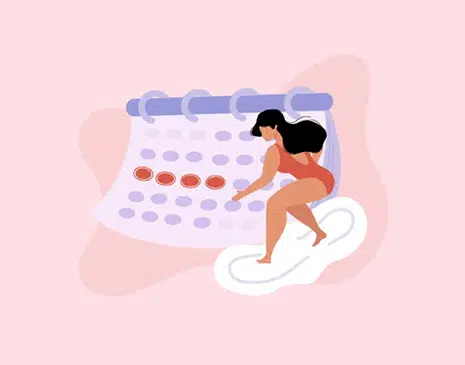We’ve all been there. We’ve all experienced firsthand a time when our period was late.
The endless meandering through our minds seeking confirmation that we’ve calculated our period arrival date correctly. Only to be reassured of our excellent mathematical abilities yet left with a tonne of worry as to why our period has still not arrived. The medical term for this absence of menstruation is amenorrhea. Let’s take a closer look at what causes amenorrhea and how to fix amenorrhea should you ever experience it.
Firstly, what is amenorrhea?
Amenorrhea is the medical term used to describe the absence of menstruation in a woman during her reproductive years (from the age of puberty through to menopause). There are two types of amenorrhea; primary amenorrhea and secondary amenorrhea. Primary amenorrhea exists in women who have reached the age of 16 yet haven’t experienced their first period yet. Secondary amenorrhea describes the absence of periods in women who have previously been menstruating for six months or more.
What are the common causes of amenorrhea?
- Pregnancy: The most common cause of amenorrhea is pregnancy. Even when using birth control correctly, no birth control pill is 100-percent effective, so a missed period could still signal pregnancy. If you think you could be on your way to a nine-month bump, buy a pregnancy test from your local pharmacy for confirmation.
- Excessive Exercise: Hitting the gym too frequently or working out at a constantly high intensity can cause your body to skip a period in what’s known as exercise-induced amenorrhea. While you probably think you’re doing your body a massive favour, too much of a good thing can cause a release of extra stress hormones. Plus, if you’re burning a large amount of energy but failing to replenish with extra calories from food, your body can fall into ‘starvation mode’. In this state, the body shuts down non-essential bodily processes aka your period.
- Stress: Excessive stress can affect your body’s production of specific hormones, leading to a period that’s MIA.
- Extreme Dieting or Sudden Weight Loss: Extreme dieting, body detoxes, and fasting can be dangerous for the female body. When the body loses a significant amount of weight in a short timeframe, there’s a chance Aunt Flow won’t be coming to visit that month. Missed periods are heavily linked to eating disorders however it’s important to know that you don’t need to be diagnosed with an eating disorder for your period to stop as result of insufficient food intake.
- Weight Gain or Obesity: On the flip side, missed periods can also occur when one experiences rapid weight gain or obesity.
- Polycystic Ovary Syndrome (PCOS): PCOS is a common condition caused by a hormonal imbalance. In terms of how PCOS can affect your period – this is normally the result of a hormonal imbalance that disrupts the development and release of eggs. Other symptoms of PCOS include acne, weight gain, thinning hair and excessive growth of body hair.
What to do when you experience a missed period?
If you’ve experienced a menstrual disappearing act, there’s no need to panic. The female body, albeit beautiful, can do some downright strange things at times, with and without reason. Plus, it’s completely normal for the menstrual cycle to sporadically throw a surprise in the form of a late arrival. If you’re still concerned after a few days, visit your trusted doctor for a chat.
This blog is designed to be informative and educational. It is not intended to provide specific medical advice or replace advice from your medical practitioner.













